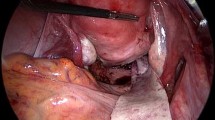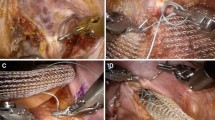Abstract
Background
Laparoscopic ventral mesh rectopexy is a novel procedure to correct internal and external rectal prolapse. Several authors have shown that this approach is safe and improves obstructive defaecation symptoms and faecal incontinence, without inducing new-onset constipation, possible after posterior rectopexy. Over the last decade, as for other procedures, biological meshes are used to correct pelvic floor disorders. Literature data are scant. In this study, we present our experience with this procedure using biological mesh.
Patients and Methods
Prospectively collected data on laparoscopic ventral mesh rectopexy for internal rectal prolapse were analysed. All patients underwent preoperative evaluation with defaecating proctography and/or pelvic dynamic MRI, full colonoscopy, anal physiology studies and endo-anal ultrasound. End-points were to evaluate surgical complications and functional results of this technique such as changes in bowel function (Wexner Constipation Score and Faecal Incontinence Severity Index) at 3 and 6 months. Analysis was performed using Mann–Whitney U test for unpaired data and Wilcoxon signed rank test for paired data (two-sided p test).
Results
Thirty-four consecutive patients underwent laparoscopic ventral mesh rectopexy (median age 59, range 25–78 years, mean follow-up was 12 months). Twenty-eight patients (82%) had a constipation score ≥5, while 14 (41%) a FISI score ≥10. Nine patients (26%) had mixed obstructed defaecation and faecal incontinence. One patient required conversion to open (3%). Median length of stay was 2 days. Overall complication rate was 23.5%. Preoperative constipation (median Wexner score 15) and faecal incontinence (median FISI score 12) improved significantly at 3 months (Wexner 5, FISI 5, both p < 0.001). Two patients experienced prolapse persistence or recurrence. No patients had function worsening or complained of sexual dysfunction.
Conclusions
Laparoscopic ventral mesh rectopexy using biological mesh for internal rectal prolapse is safe and effective in ameliorating symptoms of obstructed defaecation and faecal incontinence.
Similar content being viewed by others
References
Wijffels N, Cunningham C, Dixon A, Greenslade G, Lindsey I. Laparoscopic ventral rectopexy for external rectal prolapse is safe and effective in the elderly. Does this make perineal procedures obsolete? Colorectal Dis. 2011;13(5):561–6.
Collinson R, Wijffels N, Cunningham C, Lindsey I. Laparoscopic ventral rectopexy for internal rectal prolapse: short-term functional results. Colorectal Dis. 2010;12(2):97–104.
Boons P, Collinson R, Cunningham C, Lindsey I. Laparoscopic ventral rectopexy for external rectal prolapse improves constipation and avoids de novo constipation. Colorectal Dis. 2010;12(6):526–32.
Shafik A, El-Sibai O, Ahmed I. Role of the sigmoid colon in the defecation mechanism with evidence of sigmoido-anal inhibitory and ano-sigmoid excitatory reflex. Front Biosci. 2001;6:B25–9.
D’Hoore A, Penninckx F. Laparoscopic ventral recto(colpo)pexy for rectal prolapse: surgical technique and outcome for 109 patients. Surg Endosc. 2006;20(12):1919–23.
van den Esschert JW, van Geloven AA, Vermulst N, Groenedijk AG, de Wit LT, Gerhards MF. Laparoscopic ventral rectopexy for obstructed defecation syndrome. Surg Endosc. 2008; 22(12):2728–32.
Prasad ML, Pearl RK, Abcarian H, Orsay CP, Nelson RL. Perineal proctectomy, posterior rectopexy, and postanal levator repair for the treatment of rectal prolapse. Dis Colon Rectum. 1986;29(9):547–52
Shah BC, Tiwari MM, Goede MR, Eichler MJ, Hollins RR, McBride JS, Oleynikov D. Not all biologics are equal! Hernia 2011; 15: 165–171
Bako A., Dhar R. Review of synthetic mesh-related complications in pelvic floor reconstructive surgery. Int. Urogynecol J. 2009; 20: 103–111
Tan-Kim J., Menefee SA, Luber KM, Nager CW, Lukacz ES. Prevalence and risk factors for mesh erosions after laparoscopic-assisted sacrocolpopexy. Int Urogynecol J 2011; 22:205–212.
Madiba TE, Baig MK, Wexner SD. Surgical management of rectal prolapse. Arch Surg. 2005; 140(1):63–73. Review
William C. Cirocco M.D. Altemeier procedure for rectal prolapse: an operation for all ages. Dis Colon Rectum 2010;53:1618–1623.
Graham W, Clegg JF, Taylor V. Complete rectal prolapse: repair by a simple technique. Ann R Coll Surg Engl. 1984;66(2):87–9.
Boulos PB, Stryker SJ, Nicholls RJ. The long-term results of polyvinyl alcohol (Ivalon) sponge for rectal prolapse in young patients. Br J Surg. 1984;71(3):213:4
Duthie GS, Bartolo DC. Abdominal rectopexy for rectal prolapse: a comparison of techniques. Br J Surg. 1992;79(2):107–13.
Riansuwan W, Hull TL, Bast J, Hammel JP, Church JM. Comparison of perineal operations with abdominal operations for full-thickness rectal prolapse. World J Surg. 2010;34(5):1116–22.
Agachan F, Pfeifer J, Joo JS, Nogueras JJ, Weiss EG, Wexner SD. Results of perineal procedures for the treatment of rectal prolapse. Am Surg. 1997;63(1):9–12.
Bachoo P, Brazzelli M, Grant A. Surgery for complete rectal prolapse in adults. Cochrane Database Syst Rev. 2000;(2):CD001758. Review.
Samaranayake CB, Luo C, Plank AW, Merrie AE, Plank LD, Bissett IP. Systematic review on ventral rectopexy for rectal prolapse and intussusception. Colorectal Dis. 2010;12(6):504–12. Review.
Silvis R, Gooszen HG, van EA, de Kruif AT, Janssen LW (1999). Abdominal rectovaginopexy: modified technique to treat constipation. Dis Colon Rectum. 42(1):82–88.
Bakshi G, Ranka S, Agarwal S, Shetty SV. Modified mesh rectopexy: a study. J Postgrad Med 200; 46(4):265–7
Verdaasdonk EG, Bueno de Mesquita JM, Stassen LP. Laparoscopic rectovaginopexy for rectal prolapse. Tech. Coloproctol 2006; 10(4):318–22
Portier G, Iovino F, Lazorthes F. Surgery for rectal prolapse: Orr–Loygue ventral rectopexy with limited dissection prevents postoperative-induced constipation without increasing recurrence. Dis Colon Rectum 2006; 49(8): 1136–40
Auguste T, Dubreuil A, Bost R, Bonaz B, Faucheron JL. Technical and functional results after laparoscopic rectopexy to the promontory for complete rectal prolapse. Prospective study in 54 consecutive patients. Gastroenterol Clin boil 2006; 30(5):659–63
Cristaldi M, Collison R, Boons P, Cunnigham C, Lindsey I. Laparoscopic anterior rectopexy: a new approach that still cures rectal prolapse, but also improves preoperative constipation without inducing new-onset constipation. Dis Colon Rectum 2007;50:721
Slawik S, Soulsby R, carter H, Payne H, Dixon AR. Laparoscopic ventral rectopexy, posterior colporrhaphy and vaginal sacrocolpopexy for the treatment of recto-genital prolapse and mechanical outlet obstruction. Colorectal Dis. 2008;10(2): 138–43
Wong M, Meurette G, Abet E, Povedin J, Lehur PA. Safety and efficacy of laparoscopic ventral mesh rectopexy for complex rectocele. Colorectal Dis 2010;13:1019–1023.
Yakut M, Kaymakcioglu N, Simsek A, Tan A, Sen D. Surgical treatment of rectal prolapse. A retrospective analysis of 94 cases. Int Surg. 1998;83(1):53–5.
Lechaux JP, Lechaux D; Perz M. Results of Delorome’s procedure for rectal prolapse. Advantages of modified technique. Dis Colon Rectum. 1995;38(3):301–7.
Brazzelli M., Bachoo P., Grant A. Surgery for complete rectal prolapse in adults (review). Cochrane Database Syst. Rev. 2000.
Drexnik Z., Vishne TH., Kristt D., Alper D., Ramadan E. Rectal prolapse: a possible under-recognized complication of anorexia nervosa amenable to surgical correction. Int. J. Psychiatry Med 2001; 31 (3): 347–52
Peppas G, Gkegkes ID, Makris MC, Falagas ME. Biological mesh in hernia repair, abdominal wall defects, and reconstruction and treatment of pelvic organ prolapse: a review of the clinical evidence. Am Surg. 2010;76(11):1290–9. Review.
Athanasiadis S, Weyand G, Heiligers J. The risk of infection of three synthetic materials used in rectopexy with or without colonic resection for rectal prolapse. Int J Colorectal Dis 1996; 11:42–44
Franklin ME Jr, Treviño JM, Portillo G, Vela I, Glass JL, González JJ. The use of porcine small intestinal submucosa as a prosthetic material for laparoscopic hernia repair in infected and potentially contaminated fields: long-term follow-up. Surg Endosc. 2008; 22(9):1941–6.
Parker DM, Armstrong PJ, Frizzi JD, North JH Jr. Porcine dermal collagen (Permacol) for abdominal wall reconstruction. Curr Surg. 2006;63(4):255–8.
Disclosure
Drs. Pierpaolo Sileri, Luana Franceschilli, Sara Lazzaro, Giulio P. Angelucci, Valeria Fiaschetti, Carolina Pasecenic, Achille L. Gaspari have no conflicts of interest or financial ties to disclose.
Author information
Authors and Affiliations
Corresponding author
Rights and permissions
About this article
Cite this article
Sileri, P., Franceschilli, L., de Luca, E. et al. Laparoscopic Ventral Rectopexy for Internal Rectal Prolapse Using Biological Mesh: Postoperative and Short-Term Functional Results. J Gastrointest Surg 16, 622–628 (2012). https://doi.org/10.1007/s11605-011-1793-2
Received:
Accepted:
Published:
Issue Date:
DOI: https://doi.org/10.1007/s11605-011-1793-2




